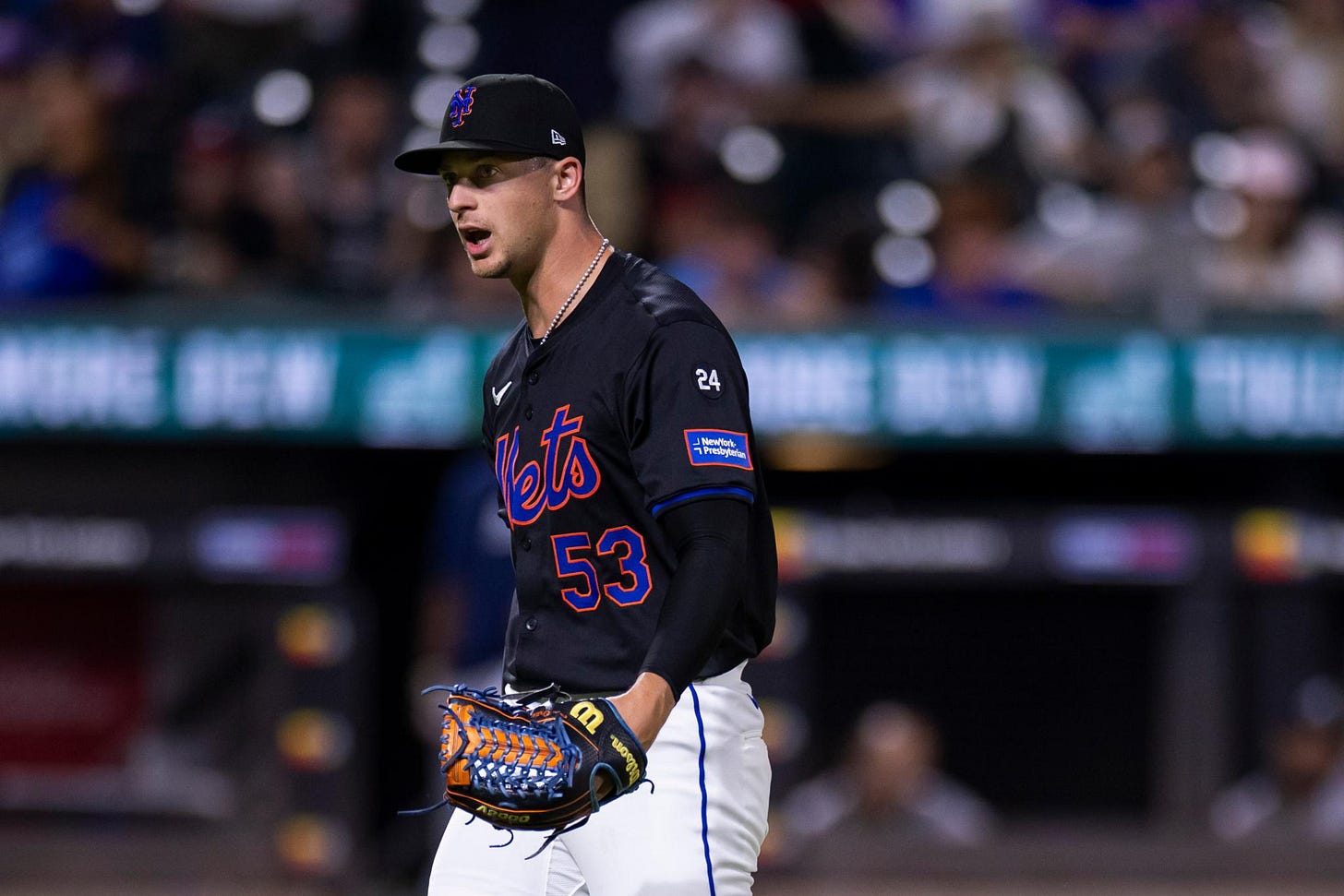Eric Orze is Not Your Enemy
He plays for the Mets — and he can't help it
Big news: my book is out! It’s called “Only in Queens: Stories from Life as a New York Mets Fan,” and it’s available on Amazon in paperback and e-book format. If you read this newsletter and enjoy submerging yourself in random Mets seasons, I’m confident it’s the book for you, and I hope you’ll give it a look. It includes stories about both Valentino Pascucci and Richard Hidalgo.
You have to feel for Eric Orze. His Citi Field debut quickly devolved into something depressing, which you don’t expect in a game featuring a six-run lead over a division rival on a Friday night. Orze, making his second career appearance, quickly heard the boos after Marcell Ozuna, his first batter, homered, and Matt Olson took a four-pitch walk.
But the boos, of course, were for more than a homer and a walk; they were for the situation. Kodai Senga, making his return from a rehab process that might understatedly be called lengthy, struck out nine in 5 1/3 excellent innings, looking every bit like he did during his dominant 2023 season, before suddenly falling to the grass grabbing at his left calf as Pete Alonso caught Austin Riley’s pop-up to lead off the sixth.
You could feel the malaise in the stands at Citi Field as we realized we were grappling with a depressingly familiar phenomenon, poking its head up at exactly the wrong time: around the Mets, the highs are often accompanied by lows, which means you end up right back at sea level. When you’re expecting to soar like a Francisco Alvarez second-deck shot, it stings to fall meekly back to earth short of the warning track.
It’s not always as overt as Senga falling down in pain on the field, but it’s always happening. The Mets have put together a superb stretch, going 31-13 since June 3, but they’ve also lost a bullpen’s worth of relievers: Brooks Raley and Drew Smith for the season, and Dedniel Nuñéz, Reed Garrett, and Sean Reid-Foley at least for now. Even as Senga returned, Christian Scott landed on the IL. Ready to celebrate? Keep an eye out for a reason not to.
Senga limping off the field, Ozuna homering and sashaying around the bases as if begging for retaliation, and then a four-pitch walk? Stronger souls than Eric Orze would have been bruised. It doesn’t help that Orze may well be optioned back to Triple-A Syracuse any day (or any minute). His Citi Field debut, which should have been a celebratory part of a chest-pounding win to leapfrog the Braves in the standings, turned into a vehicle for Mets fans to express their disgust with the unfairness of the universe, which isn’t something that Eric Orze can fix.
As a unit, though, the Mets did all they could. Orze didn’t allow another run, finishing the sixth and pitching a scoreless seventh in what did become a fairly triumphant home debut. Jose Iglesias, continuing the season-long process that has seen him become one of the most surreally enjoyable Mets characters I can remember, shut down a potential Braves rally in the eighth with a diving stop. Jake Diekman, on for the ninth with a five-run lead, allowed a leadoff home run, but struck out three of his next four batters, and the Mets, 10 games behind the Braves in the standings on May 30, climbed past them before the close of July.
Really, it wouldn’t be a true Mets game without some sort of cosmic equivalent of Jake Diekman (Gonzalez Germen?), pitching the ninth to give Edwin Díaz (Jenrry Mejia?) a day off, allowing a leadoff home run (two-run double with two outs) to Adam Duvall (Justin Bour) in an 8-4 (11-5) win over the Braves (Marlins). June 22, 2014 — look it up.
All the offense the Mets would need came in the third, in one of those innings that Mets fans will spend decades dreaming about, and recall for eternity when it happens. Facing the preternaturally annoying Charlie Morton, loading the bases with drips and drabs before a grand slam from your sage veteran DH, and then, for good measure, getting homers from your young star catcher and third baseman? That never happens. So it’s unforgettable when it does.
The upshot of it all? A 55-48 club, situated neatly in the top Wild Card slot, which is a fancy way of saying that all the Mets need to do from here on out is play better than the teams behind them. They control their own destiny. Isn’t that terrifying? Sure, a win is a win, and a win over the Braves is a win over the Braves, and playoff position is playoff position, for all the good it’ll do ya.
But the memory of those boos, and what they mean, isn’t going away. Not for me, at least. As Orze stood on the Citi Field mound, hearing the crowd and trying to collect himself, I wonder if it dawned on him what was happening.
He’s a Met. That’s the team he plays for, but it’s also a phenomenon decades in the making; a phenomenon that means that when your ace comes back from a four-month absence, you’d better watch out, because the next problem might be just around the corner. Orze can’t change the way the universe regards the Mets, so he certainly shouldn’t take it personally — and he should know the truth.
It wasn’t Eric Orze they were booing.


